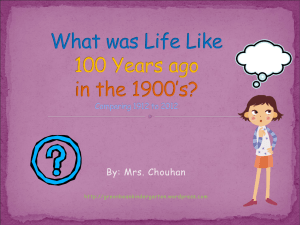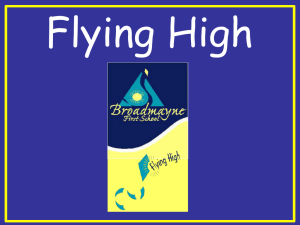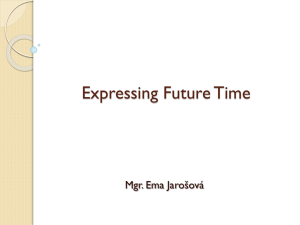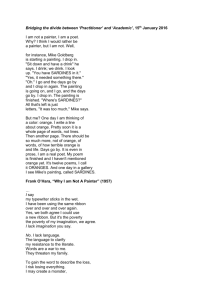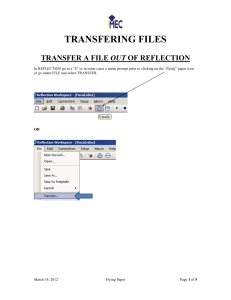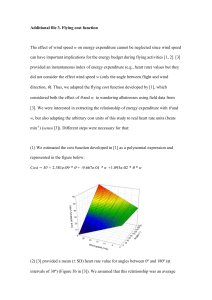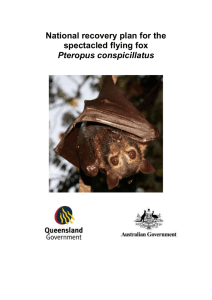Internship Summary
advertisement
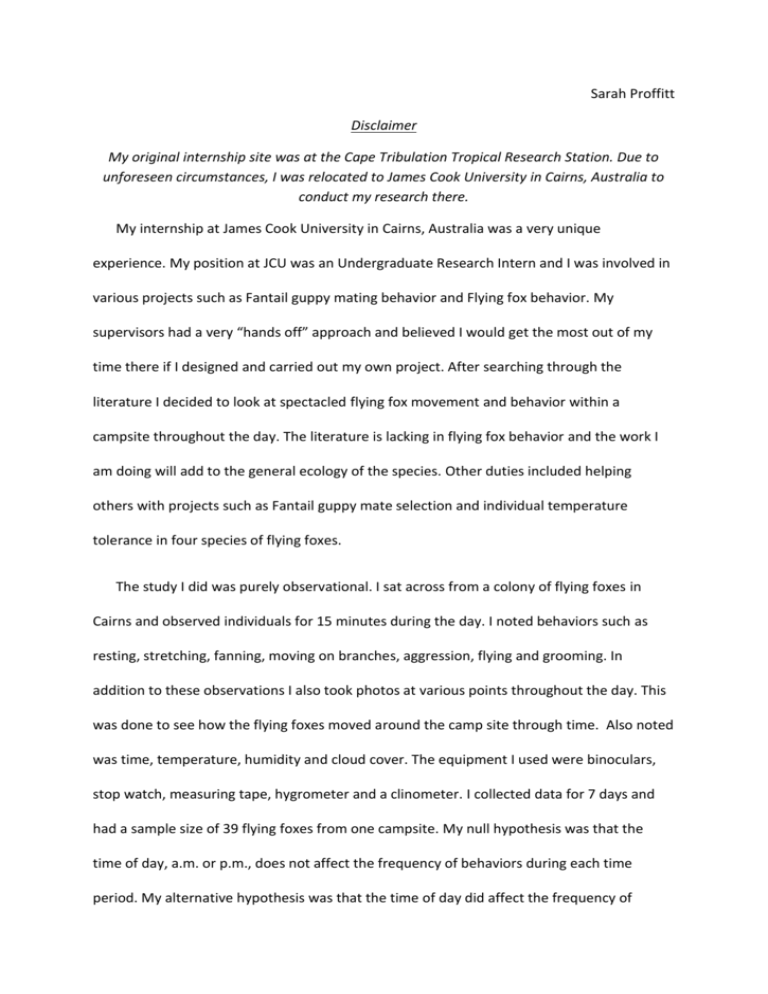
Sarah Proffitt Disclaimer My original internship site was at the Cape Tribulation Tropical Research Station. Due to unforeseen circumstances, I was relocated to James Cook University in Cairns, Australia to conduct my research there. My internship at James Cook University in Cairns, Australia was a very unique experience. My position at JCU was an Undergraduate Research Intern and I was involved in various projects such as Fantail guppy mating behavior and Flying fox behavior. My supervisors had a very “hands off” approach and believed I would get the most out of my time there if I designed and carried out my own project. After searching through the literature I decided to look at spectacled flying fox movement and behavior within a campsite throughout the day. The literature is lacking in flying fox behavior and the work I am doing will add to the general ecology of the species. Other duties included helping others with projects such as Fantail guppy mate selection and individual temperature tolerance in four species of flying foxes. The study I did was purely observational. I sat across from a colony of flying foxes in Cairns and observed individuals for 15 minutes during the day. I noted behaviors such as resting, stretching, fanning, moving on branches, aggression, flying and grooming. In addition to these observations I also took photos at various points throughout the day. This was done to see how the flying foxes moved around the camp site through time. Also noted was time, temperature, humidity and cloud cover. The equipment I used were binoculars, stop watch, measuring tape, hygrometer and a clinometer. I collected data for 7 days and had a sample size of 39 flying foxes from one campsite. My null hypothesis was that the time of day, a.m. or p.m., does not affect the frequency of behaviors during each time period. My alternative hypothesis was that the time of day did affect the frequency of behaviors. My reasoning behind this had a lot to do with temperature. In the morning when the flying foxes had just returned to the roost it was quite cool and they were quite active with vocalizing and moving about the camp. As the day continued, temperatures rose and, theoretically, the flying foxes should spend more time resting in the shade to try and keep cool. I am still in the process of analyzing my data and am continuing to work with my contacts here in Australia until I can produce a research paper. Once I have a finished product I will submit it to my supervisors at JCU as well as here at OSU. In addition to my research project I volunteered at the Tolga Bat Hospital. This bat rehabilitation and education center housed over 100 non-releasable bats. While I was there I learned how to capture and handle flying foxes, feed, build juvenile cages and clean enclosures. I assisted researchers from JCU on various projects such as temperature thresholds across flying fox species and a novel food study. In the temperature threshold study bats were put in a controlled chamber and the temperature was raised one degree every five minutes. In both of these projects I assisted with handling animals and preparing food items. My supervisor let me set my own learning objectives so designing and carrying out my own project was my main objective. With the help of various people at JCU I was able to conduct my research and analyze my data effectively. On a side note, I also wanted more hands on experience with flying foxes by learning how to capture and handle them at the Tolga Bat Hospital. I accompanied two of my supervisors on their frequent visits to the hospital for their own research projects. While there, I assisted them with capturing and handling the flying foxes and microbats. When my assistance wasn’t necessary, the hospital owner let me help her with various tasks such as examining injuries, washing and feeding flying foxes. I believe my role as an intern at JCU was very important not only for me but the general public as well. Just as I arrived in Cairns there was a proposition to relocate the flying fox colony in town. This colony had resided in Cairns for over 35 years and was thought of as a pest to some people because of the noise and unpleasant smell. Since the study I had designed was on this said colony I quickly got out in the field to begin my observations. While I was out collecting data many people would come up to me and ask me what I was doing. I took it upon myself to give little lectures about how important flying foxes are for tropical rainforest regeneration. Many people seemed surprised and walked away with a new found respect for these creatures. Flying foxes get a bad reputation because of their potential to pass on diseases and their consumption of plantation fruits. A lot of what the general public hears in the media is mostly hype and is rarely backed by real science and that’s why it is important to be out in the public talking to people. My research project may also be a valuable input into the general ecology of the spectacled flying fox. Bats are naturally a difficult species to study so they often are overlooked. The project was especially important because the Cairns colony was meant to be relocated by cutting back the branches in their roost trees. Flying foxes are important seed dispersers and pollinators of rainforest flora but are currently listed as Vulnerable under the Environmental Protection and Biodiversity Conservation Act 1999. Without the Spectacled flying fox the Wet Tropics world heritage landscape may be further reduced or lost entirely (CSIRO 2009). This internship let me put into practice the skills I had learned in classes such as Field Sampling and Mammal Conservation and Management. In Field Sampling I was in a group and had help from my professor and T.A. but in this project I was on my own. I am very grateful that I had taken field sampling classes prior to this internship because without them it would have been much more difficult. I have taken statistics so that was very helpful, although, I still needed some help analyzing the data. Now that I have had some experience talking to the public I would like to further enhance my communication skills. Taking more COMM classes would be beneficial but also classes like FW 488/499 will be helpful because of their group work and public speaking components. My trip to Australia really validated my passion for wildlife. I fell in love with the flying foxes instantly and can’t imagine not being able to see them every day. I am already a devoted student but now I have more motivation to be more involved in public outreach type organizations. This internship also planted the idea of doing research as a career later in my life. This, of course, will require more school which I was undecided about before. I am giving strong consideration to doing my master’s at James Cook University. I would get my Masters of Philosophy (research) in Ecology and Conservation at the Cairns campus. If someone would have asked me two years ago if I wanted a Masters degree I would have laughed. Now, I see the excitement of advancing my education and feel a Masters abroad focusing on tropical ecosystems will be attractive to future employers. Also, the possibility of finding a career here in Australia is very intriguing to me. I have also made a goal for myself to be more outgoing and comfortable with public speaking. I am currently a Student Ambassador for the IE3 program on the OSU campus. This gives me the opportunity to talk to prospective students about my experience in Australia. I also am gaining valuable public speaking experience as I regularly participate in class presentations. The opportunity to go abroad for my intensive internship was truly amazing. Australia opened up an entire new world for me to explore. I love the culture, landscape and the wildlife. As I prepare to leave here I feel tore between my life at home and my life here. I feel as if I have discovered what is really important to me and have come back to the U.S.A a different person, or just a new version of myself. A personal goal of mine for this trip was to validate my independence and I feel I accomplished that. I learned that I am a resilient person and am willing and able to face any challenge ahead of me. The internship was only half of the experience for me. The friendships and experiences outside of my work were life changing. I am grateful that the faculty and staff at James Cook University taking me on as an intern. JCU is ranked as one of the world’s top universities and is a leader in research pertaining to the tropical environment. I also learned am grateful for my internship program, IE3. In my time overseas I became very close to my regional director, Cynthia Engel. She helped me through some difficult times I had and I am so grateful OSU works with IE3 because they provide amazing opportunities and are a great support system for undergraduates. Citations Westcott, David. "Spectacled Flying fox." CSIRO., 24 12 2009. Web. 27 Aug 2013. <http://www.csiro.au/Outcomes/Environment/Biodiversity/Spectacled-Flying-Fox.asp&xgt;.
